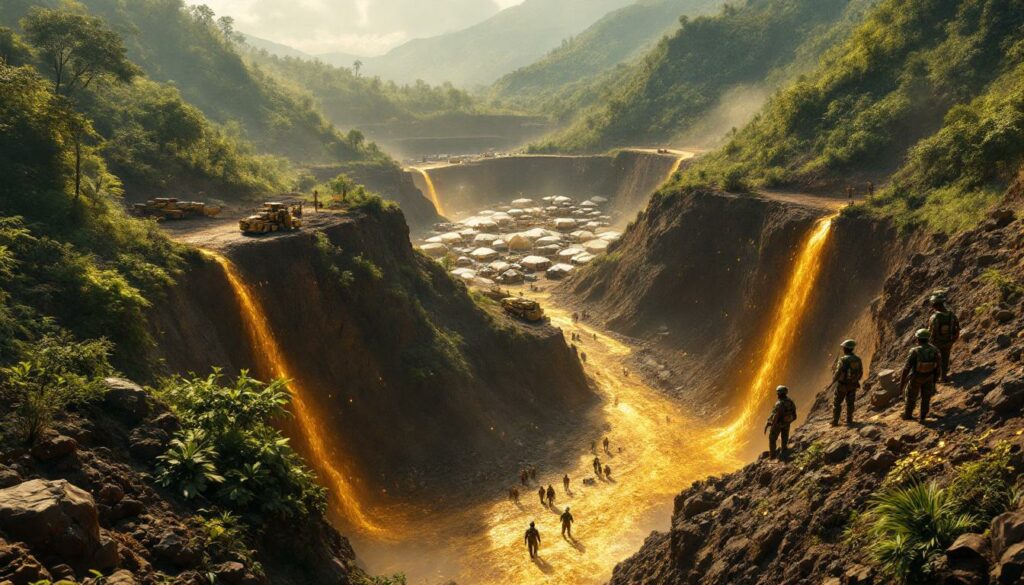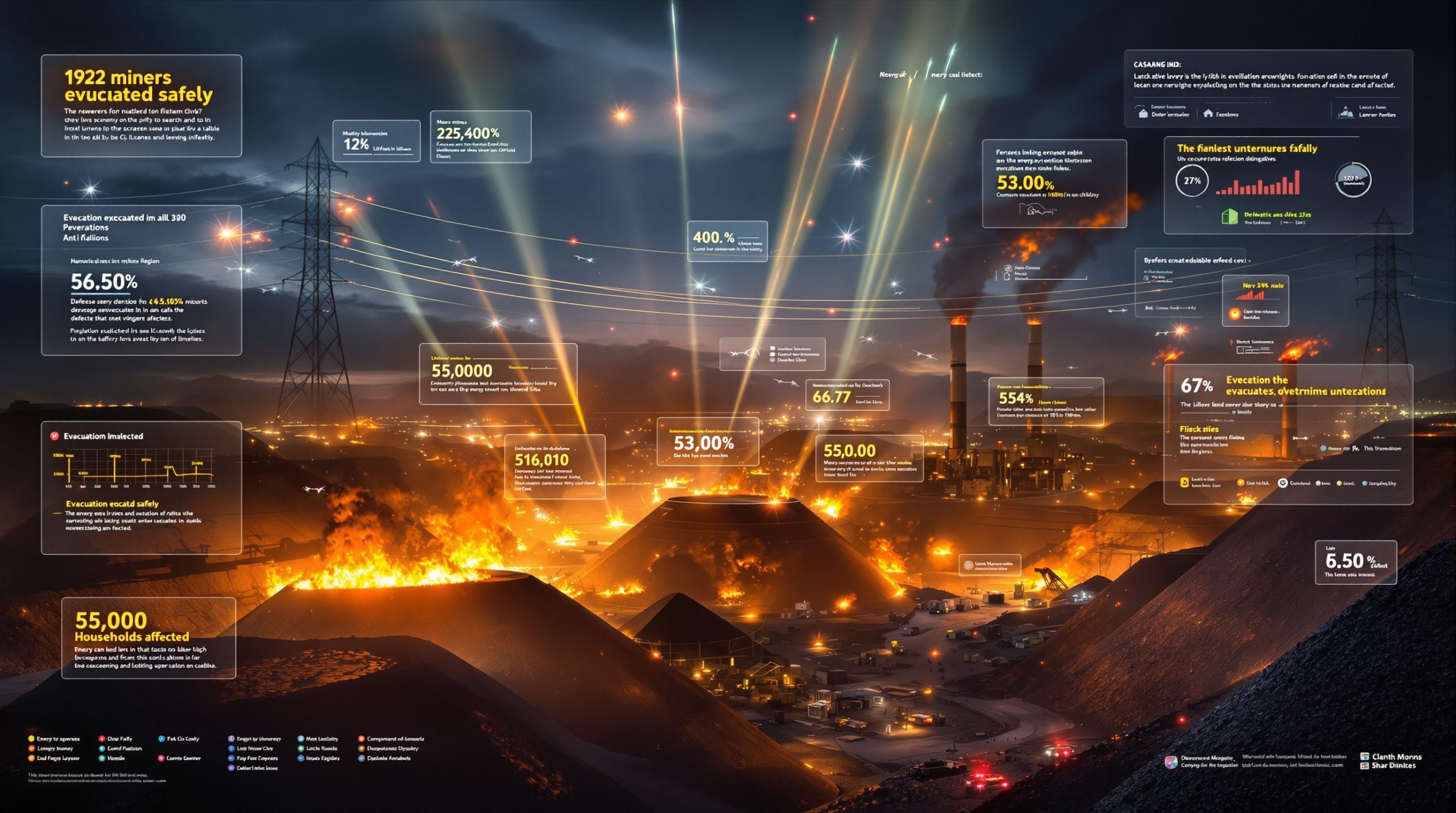Crisis Deepens as M23 Rebels Seize Congo's Twangiza Gold Mine
In a significant escalation of eastern Congo's ongoing conflict, Chinese-owned Twangiza Mining SA has reported that M23 rebels have completely seized control of its gold mining operations in South Kivu province. The takeover, which began in May 2025 with an order to suspend operations over alleged tax non-payment, has evolved into what the company describes as a humanitarian crisis for its workers.
According to a company statement released on June 28, 2025, the mine site is now "entirely controlled" by individuals claiming to be new investors, who have forced employees to continue production under dire conditions.
"Workers are being held in captivity, forced to work in inhuman conditions, without any security measures, remuneration, or medical coverage," the statement declared, describing a situation where employees are treated "like slaves deprived of all protection."
M23's Expanding Control of Eastern Congo's Resources
The seizure of Twangiza represents a troubling expansion of M23's territorial control. The rebel group has made unprecedented advances across North and South Kivu provinces in 2025, now controlling more territory than at any point in its history. This territorial expansion has had devastating humanitarian consequences, with thousands killed and hundreds of thousands displaced from their homes.
Mining operations have become prime targets in this conflict. Reports indicate that the rebels are systematically targeting resource-rich areas, with Chinese-owned operations facing particular scrutiny. At Twangiza, production has been "paralyzed" according to company officials, though rebels continue to extract gold under dangerous conditions.
"The exploitation of Congo's mineral wealth has long fueled conflict in the region, but the current situation represents a concerning new phase where armed groups are directly managing production rather than simply taxing it," notes the UN Group of Experts on the Democratic Republic of Congo.
Rwandan Connections Fuel Regional Tensions
The situation at Twangiza has intensified accusations of foreign involvement in eastern Congo's conflict. Twangiza Mining claims that Rwandan nationals are working alongside M23 rebels to exploit the mine "for their own profit," allegations that mirror broader international concerns.
The DRC government, United Nations, and Western powers have consistently accused Rwanda of supporting M23 with troops, arms, and logistical support – claims Rwanda vehemently denies. Rwanda's government spokesperson Yolande Makolo specifically rejected any involvement in the Twangiza situation on June 30, 2025, calling accusations against Rwandan citizens "without basis."
Rwanda maintains that its military actions in the region are strictly defensive, targeting Congo's army and ethnic Hutu militiamen linked to the 1994 Rwandan genocide. This longstanding dispute over Rwanda's role has complicated diplomatic efforts to resolve the conflict.
Diplomatic Breakthroughs Amid Ongoing Violence
Despite the deteriorating situation at Twangiza, recent diplomatic developments offer tentative hope for resolution. On June 28, 2025, foreign ministers from Rwanda and Congo signed a U.S.-brokered peace deal aimed at ending the current hostilities. This agreement comes as Qatar continues to host separate talks between Congo and M23 representatives.
The Trump administration has taken a particularly active role in these negotiations, motivated in part by strategic mineral interests. Trump's critical minerals order has indicated plans to attract "billions of dollars in Western investment" to Congo's mineral sector, which contains critical deposits of tantalum, gold, cobalt, copper, and lithium – all essential components for global technology supply chains.
"Congo's mineral wealth represents both the source of its suffering and the key to its potential prosperity," commented a U.S. State Department official involved in the negotiations. "Securing peaceful access to these resources benefits everyone – the Congolese people first and foremost, but also global markets that depend on these minerals."
Competing Investment Interests in Congo's Mining Sector
The contest for control of Congo's resources extends beyond military conflicts to economic competition between major powers. Chinese companies have established significant mining operations throughout the DRC over the past decade, while Western nations have recently renewed interest in securing their own access.
This competition creates complex dynamics for mining operations caught in conflict zones. At Twangiza, the disruption has completely halted legitimate gold production, illustrating the vulnerabilities facing foreign investments in eastern Congo. Similar challenges affect operations across both Kivu provinces, including the strategically important Rubaya mine, which produces minerals vital for smartphones and electric vehicles.
Mining Industry Risk Factors in Eastern Congo:
- Rebel group control of transportation routes
- Forced taxation by multiple armed factions
- Worker safety and humanitarian concerns
- Compliance with conflict minerals regulations
- Reputational risks for international companies
The disruptions at Twangiza and other mines create significant uncertainty for Congo's mining sector, potentially deterring future investment despite the country's extraordinary mineral wealth. Operations in rebel-controlled territories face particularly acute challenges in maintaining both production and ethical standards.
Humanitarian Crisis Intensifies for Mining Communities
The situation at Twangiza highlights the severe human cost of resource-based conflicts. Workers reportedly face conditions that meet international definitions of forced labor and modern slavery. Without pay, medical coverage, or basic safety measures, miners are subjected to dangerous conditions while having no freedom to leave.
"These workers have effectively been conscripted into forced labor under threat of violence," explains a representative from Human Rights Watch familiar with similar cases in eastern Congo. "They face a terrible choice between dangerous work without compensation or potential reprisals for attempting to flee."
Independent verification of these claims remains difficult due to security constraints. Reuters reported they could not independently verify the company's assertions, underscoring the challenges of monitoring human rights in active conflict zones.
Broader Displacement Crisis Continues
Beyond the immediate situation at Twangiza, the broader M23 conflict has created one of Africa's most severe displacement crises. Hundreds of thousands of civilians have fled their homes since fighting intensified in early 2025, with many living in makeshift camps with limited humanitarian access.
Communities near mining operations often face heightened security risks, caught between rebel groups seeking resource control and government forces attempting to reclaim territory. Local populations bear the disproportionate burden of violence while seeing minimal benefit from the mineral wealth extracted from their lands.
The United Nations Office for the Coordination of Humanitarian Affairs (OCHA) has documented significant protection concerns in mining areas, including:
- Forced recruitment of miners and porters
- Sexual violence against women in mining communities
- Child labor in artisanal mining operations
- Extortion and illegal taxation by armed groups
- Limited access to healthcare for mining-related injuries
Understanding Congo's Mining Conflicts: Key Questions
Are other mines affected by rebel activity in eastern Congo?
Twangiza is far from the only mine affected by rebel activity. Several operations across eastern Congo face similar security challenges, though the specific actors and dynamics vary by location. The Rubaya mine in North Kivu, which produces coltan and tantalum vital to global technology supply chains, has also attracted attention from investors despite persistent security concerns in the region.
"The pattern of resource capture by armed groups has been consistent in eastern Congo for decades," explains a regional security analyst. "What's changed is the scale and sophistication of these operations, with rebels now directly managing production rather than simply taxing it."
How does this conflict affect global mineral supplies?
While Congo is a significant producer of gold and other critical minerals, the current disruption at individual mines like Twangiza has limited immediate impact on global supply chains. However, persistent instability threatens long-term investment and development of Congo's vast mineral resources, which include:
- 70% of global cobalt production
- Significant gold reserves in eastern provinces
- Strategic tantalum and coltan deposits
- Substantial copper and lithium resources
Market analysts note that while gold prices analysis has remained relatively stable despite the Twangiza situation, continued disruptions could eventually impact specialized technology metals with fewer alternative sources.
What verification exists for the forced labor claims?
Independent verification remains challenging due to security constraints in rebel-controlled territories. Reuters explicitly noted they could not independently verify the company's assertions about worker conditions at Twangiza. This verification gap highlights the difficulty of monitoring human rights in conflict zones where journalists and humanitarian organizations have limited access.
The OECD Due Diligence Guidelines recommend third-party monitoring of mining operations in conflict-affected areas, but implementation becomes nearly impossible when sites are under rebel control. Remote monitoring through satellite imagery can confirm continued operations but cannot verify specific labor conditions.
What role do international companies play in conflict-affected mining regions?
International companies operating in conflict zones face complex ethical and security challenges. They must navigate relationships with local authorities, armed groups, and communities while adhering to international standards on human rights and responsible sourcing.
The Twangiza situation demonstrates the extreme vulnerability of mining operations when security deteriorates. Companies face difficult decisions about whether to continue operations under dubious arrangements with armed groups, suspend activities entirely, or attempt to negotiate secure access through diplomatic channels.
Under the UN Guiding Principles on Business and Human Rights, companies have clear responsibilities to prevent complicity in human rights abuses, even in challenging operational environments. Specialized due diligence frameworks for conflict minerals provide guidance, but implementation remains difficult in active conflict zones.
How does this situation compare to historical mining conflicts in Congo?
Eastern Congo has experienced resource-related conflicts for decades, with armed groups frequently controlling mining sites. The current situation follows a pattern where mineral wealth becomes both a driver of conflict and a means to finance armed groups.
Historical parallels include:
- The "coltan boom" of the early 2000s that financed multiple armed groups
- Gold mining operations controlled by various rebel factions during the Congo Wars
- Conflict mineral regulations that emerged following international attention in the 2010s
- Recurring cycles of resource capture in areas with weak government control
What distinguishes the current situation is M23's unprecedented territorial control and the direct involvement of rebels in day-to-day mining operations rather than simple taxation or protection rackets.
Looking Forward: Prospects for Resolution
As diplomatic efforts continue, the fate of Twangiza and similar operations remains uncertain. The U.S.-brokered peace deal offers hope for eventual stability, but implementing agreements in eastern Congo has historically proven challenging. Much depends on Rwanda's willingness to disengage from the conflict and M23's response to diplomatic pressure.
For mining operations, establishing secure and ethical supply chains will require significant international cooperation. The combination of growing global demand for critical minerals and increasing scrutiny of supply chain ethics creates both challenges and opportunities for Congo's mining sector.
Recent developments in the region, including the DRC cobalt export ban and the Paladin Energy halt of uranium operations in neighboring Namibia, illustrate the broader challenges facing the African mining sector. Furthermore, long-term gold price forecast projections suggest continued market interest in Congo's mineral resources despite the security risks.
What remains clear is that sustainable solutions must address both security concerns and the economic aspirations of local communities. Without meaningful economic benefits for Congolese citizens, the cycle of resource-driven conflict will likely continue, regardless of which group controls the mines at any given moment.
"The minerals beneath Congo's soil should be a blessing, not a curse," notes a Congolese civil society representative. "That transformation requires not just peace agreements, but fundamental changes in how mining benefits are distributed and how governance functions in resource-rich regions."
Want to Discover the Next Major ASX Mining Opportunity?
Stay ahead of the market with real-time alerts on significant mineral discoveries, powered by Discovery Alert's proprietary Discovery IQ model, and understand why historic discoveries generate substantial returns by visiting the dedicated discoveries page.




